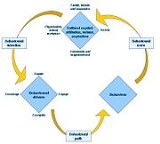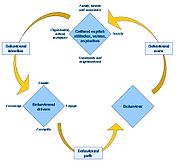
Culture change
Encyclopedia
Culture change is a term used in public policy making that emphasises the influence of cultural capital
on individual and community behaviour. It places stress on the social and cultural capital determinants of decision making and the manner in which these interact with other factors like the availability of information or the financial incentives facing individuals to drive behaviour.
These cultural capital influences include the role of parenting, families and close associates; organisations such as schools and workplaces; communities and neighbourhoods; and wider social influences such as the media. It is argued that this cultural capital manifests into specific values, attitudes or social norms which in turn guide the behavioural intentions that individuals adopt in regard to particular decisions or courses of action. These behavioural intentions interact with other factors driving behaviour such as financial incentives, regulation and legislation, or levels of information, to drive actual behaviour and ultimately feed back into underlying cultural capital.
The term is used by Knott et al. of the Prime Minister's Strategy Unit
in the publication: Achieving Culture Change: A Policy Frameworkhttp://webarchive.nationalarchives.gov.uk/20100125070726/http://cabinetoffice.gov.uk/media/cabinetoffice/strategy/assets/achieving_culture_change.pdf (Knott et al., 2008). The paper sets out how public policy can achieve social and cultural change through 'downstream' interventions including fiscal incentives, legislation, regulation and information provision and also 'upstream' interventions such as parenting, peer and mentoring programmes, or development of social and community networks.
The key concepts the paper is based on include:
Knott et al. use examples from a range of policy areas to demonstrate how the culture change framework can be applied to policymaking. For example:

Cultural capital
The term cultural capital refers to non-financial social assets; they may be educational or intellectual, which might promote social mobility beyond economic means....
on individual and community behaviour. It places stress on the social and cultural capital determinants of decision making and the manner in which these interact with other factors like the availability of information or the financial incentives facing individuals to drive behaviour.
These cultural capital influences include the role of parenting, families and close associates; organisations such as schools and workplaces; communities and neighbourhoods; and wider social influences such as the media. It is argued that this cultural capital manifests into specific values, attitudes or social norms which in turn guide the behavioural intentions that individuals adopt in regard to particular decisions or courses of action. These behavioural intentions interact with other factors driving behaviour such as financial incentives, regulation and legislation, or levels of information, to drive actual behaviour and ultimately feed back into underlying cultural capital.
The term is used by Knott et al. of the Prime Minister's Strategy Unit
Prime Minister's Strategy Unit
The Prime Minister's Strategy Unit was an elite unit based in the UK Cabinet Office between 2002 and 2010...
in the publication: Achieving Culture Change: A Policy Frameworkhttp://webarchive.nationalarchives.gov.uk/20100125070726/http://cabinetoffice.gov.uk/media/cabinetoffice/strategy/assets/achieving_culture_change.pdf (Knott et al., 2008). The paper sets out how public policy can achieve social and cultural change through 'downstream' interventions including fiscal incentives, legislation, regulation and information provision and also 'upstream' interventions such as parenting, peer and mentoring programmes, or development of social and community networks.
The key concepts the paper is based on include:
- Cultural capital - such as the attitudes, values, aspirations and sense of self-efficacy which influence behaviour. Cultural capital is itself influenced by behaviour over time
- The shifting social zeitgeist - whereby social norms and values that predominate within the cultural capital in society evolve in over time
- The process by which political narrative and new ideas and innovations shift the social zeitgeist over time within the constraint of the 'elastic band' of public opinion
- The process of behavioural normalisation - whereby behaviour and actions pass through into social and cultural norms (for example, Knott et al. argue that the UK experience of seat belt enforcement established and reinforced this as a social norm)
- The use of customer insightCustomer insightCustomer Insight is the collection, deployment and interpretation of information that allows a business to acquire, develop and retain their customers.-Analysis:...
- The importance of tailoring policy programmes around an ecological model of human behaviour to account for how policy will interact with cultural capital and affect it over time
Knott et al. use examples from a range of policy areas to demonstrate how the culture change framework can be applied to policymaking. For example:
- To encourage educational aspiration they recommend more use of early years and parenting interventions, an improved childhood offer, and development of positive narratives on education as well as integrated advisory systems, financial assistance and targeted social marketing approaches.
- To promote healthy living and personal responsibility they recommend building healthy living into community infrastructure, building partnerships with schools and employers, more one-to-one support for wellbeing alongside use of regulation and legislation on unhealthy products, provision of robust health information and health marketing to promote adaptive forms of behaviour.
- To develop environmentally sustainable norms they recommend reinforcing sustainability throughout policy narratives, using schools and the voluntary sector to promote environmental messages, development of infrastructure that make sustainable choices easy, together with a wider package of measures on fiscal incentives, regulation, advisory services and coalition movements.

See also
- Behavioural economics
- Cultural capitalCultural capitalThe term cultural capital refers to non-financial social assets; they may be educational or intellectual, which might promote social mobility beyond economic means....
- Market FailureMarket failureMarket failure is a concept within economic theory wherein the allocation of goods and services by a free market is not efficient. That is, there exists another conceivable outcome where a market participant may be made better-off without making someone else worse-off...
- Theory of planned behaviorTheory of planned behaviorIn psychology, the theory of planned behavior is a theory about the link between attitudes and behavior. It was proposed by Icek Ajzen as an extension of the theory of reasoned action. It is one of the most predictive persuasion theories...
- Mediatization (media)Mediatization (media)In communication studies or media studies, ‘mediatization’ or ‘mediatisation’ is a term used to describe a process in which modernity is shaped. . It is a process which begins with a change in communication media and proceeds to subordination of the power of prevailing influential institutions...
External links
- Baconbutty on Culture Changehttp://baconbutty.blogspot.com/2007/08/achieving-culture-change.html
- Cut crime with drink tax, Gordon Brown told, Daily Telegraphhttp://www.telegraph.co.uk/news/main.jhtml?xml=/news/2008/02/15/nalcohol115.xml
- The naughty nation, New Statesmanhttp://www.newstatesman.com/200802140026
- Winning Hearts and Mindshttp://findarticles.com/p/articles/mi_6778/is_2008_August/ai_n28552197
- Transformer une culture : un cadre d’action pour les politiques publiqueshttp://www.strategie.gouv.fr/revue/article.php3?id_article=643 (in French)

